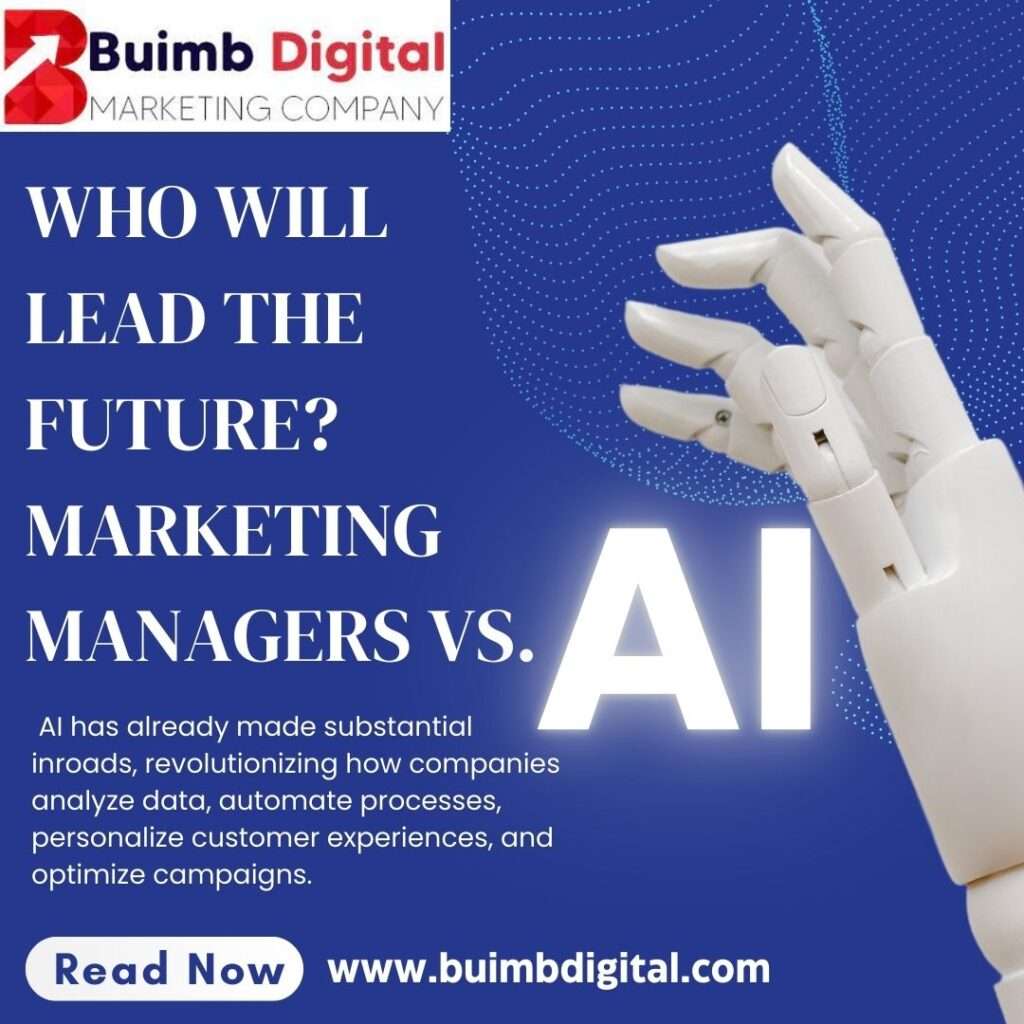Who will lead the future ?Marketing Manager vs AI
Marketing Manager VS AI
In the dynamic landscape of business and technology, the role of marketing managers has always been pivotal. These professionals are tasked with understanding consumer behavior, shaping brand identities, and driving revenue through strategic campaigns. However, the rise of artificial intelligence (AI) has introduced a new player into the field, promising to revolutionize marketing practices and potentially reshape the role of human managers. This blog explores the evolving relationship between marketing managers and AI, delving into their respective strengths, weaknesses, and the future of marketing leadership.

The Role of Marketing Managers
Marketing managers play a crucial role in organizations of all sizes and industries. Their responsibilities typically include:
- Consumer Insights: Understanding target audiences through market research and data analysis.
- Strategy Development: Creating marketing plans that align with business goals and brand vision.
- Campaign Execution: Overseeing the implementation of advertising, promotional, and digital marketing efforts.
- Brand Management: Building and maintaining brand reputation through consistent messaging and customer interactions.
- Performance Analysis: Measuring the effectiveness of campaigns and making data-driven adjustments.
These tasks require a blend of creativity, analytical skills, and strategic thinking. Marketing managers often rely on their experience and intuition to make decisions that resonate with consumers and drive business growth.
The Emergence of AI in Marketing
Artificial intelligence has rapidly transformed various industries, and marketing is no exception. AI technologies such as machine learning, natural language processing (NLP), and predictive analytics have enabled marketers to:
- Data Processing: Analyze vast amounts of consumer data to identify patterns and trends.
- Personalization: Tailor marketing messages and experiences to individual preferences and behaviors.
- Automation: Streamline repetitive tasks such as email marketing, content distribution, and customer service.
- Predictive Modeling: Forecast future trends and consumer behavior based on historical data.
AI’s ability to process data at scale and perform complex analyses in real-time has significantly enhanced the efficiency and effectiveness of marketing campaigns. It can uncover insights that human marketers might overlook and optimize strategies for maximum impact.
Strengths of Marketing Managers
Despite the advancements in AI technology, marketing managers possess several key strengths that AI cannot replicate:
- Creativity: Generating innovative ideas and compelling storytelling that resonates with consumers emotionally.
- Strategic Thinking: Developing long-term plans and adapting strategies in response to market dynamics.
- Relationship Building: Nurturing genuine connections with customers and stakeholders.
- Ethical Judgment: Making decisions that prioritize consumer privacy and trust.
These human qualities are crucial for building authentic brand experiences and fostering customer loyalty, areas where AI still struggles to match human intuition and empathy.
AI’s Impact on Marketing Managers
The integration of AI into marketing has prompted discussions about its impact on the role of marketing managers:
- Shift in Responsibilities: As AI automates routine tasks, marketing managers can focus on higher-level strategic initiatives and creative endeavors.
- Upskilling Opportunities: Learning to leverage AI tools and interpret data insights becomes essential for staying competitive in the field.
- Collaboration: Working alongside AI systems to optimize marketing campaigns and achieve better results.
While AI enhances efficiency, marketing managers remain critical for interpreting AI-driven insights, maintaining brand authenticity, and steering overall marketing strategies.
Future Trends in AI and Marketing Leadership
Looking ahead, several trends are likely to shape the future of marketing leadership:
- AI-Powered Decision Support: AI will increasingly assist marketing managers in making data-driven decisions, from segmenting audiences to predicting consumer behavior.
- Augmented Creativity: AI tools like generative design and content creation will support marketers in crafting personalized and engaging content.
- Ethical Considerations: Addressing concerns around AI’s impact on consumer privacy, data security, and algorithmic bias will become a priority.
- Hybrid Roles: Marketing managers may adopt hybrid roles, combining technical proficiency with strategic vision and creative flair.
Ultimately, successful marketing leadership in the AI era will require a blend of human ingenuity and technological prowess. By harnessing AI’s capabilities while leveraging their unique strengths, marketing managers can drive innovation and deliver exceptional customer experiences.
Conclusion
In conclusion, the future of marketing leadership will be shaped by the evolving relationship between marketing managers and AI. While AI offers unprecedented capabilities in data analysis, automation, and personalization, marketing managers bring irreplaceable qualities such as creativity, strategic thinking, and ethical judgment to the table. By embracing AI as a powerful ally rather than a threat, marketing managers can enhance their effectiveness, optimize campaign outcomes, and propel their organizations toward sustained growth.
As we navigate this transformative era, one thing is clear: the most successful marketing leaders will be those who can adeptly harness the strengths of both human expertise and artificial intelligence to innovate, connect with consumers, and lead their teams to success in the digital age.
5.How to create the ultimate Social Media Strategy that Drives Brand Awareness&ROI?
Understanding the Foundations of a Successful Social Media Strategy
Before diving into tactics, it’s crucial to lay a solid foundation for your social media strategy. Here are the key steps:
- Define Your Goals and Objectives
Every effective strategy starts with clear goals. Determine what you want to achieve through social media—whether it’s increasing brand awareness, driving website traffic, generating leads, or improving customer engagement. Your goals will guide all subsequent decisions and actions.
- Know Your Audience
Understanding your target audience is essential for crafting relevant content and messages. Develop detailed buyer personas that outline demographics, interests, pain points, and social media habits of your ideal customers. This knowledge will help you tailor your content to resonate with your audience.
- Research Your Competitors
Analyzing your competitors’ social media presence can provide valuable insights into what works in your industry. Identify their strengths and weaknesses, observe their content strategies, and look for opportunities to differentiate your brand.
- Choose the Right Platforms
Not all social media platforms are created equal. Select platforms where your target audience is most active and where your brand can effectively communicate its message. Consider factors like demographics, user behavior, and the type of content that performs well on each platform.
- Set Key Performance Indicators (KPIs)
Establish measurable KPIs aligned with your goals to track the success of your social media efforts. Examples include engagement rate, reach, conversion rate, and return on ad spend (ROAS). Regularly monitor these metrics to evaluate performance and make data-driven optimizations.
Crafting Your Social Media Strategy
With a solid foundation in place, it’s time to develop a comprehensive social media strategy that maximizes brand awareness and ROI. Here’s how:
- Content Strategy
Content lies at the heart of any successful social media strategy. Your content should be valuable, relevant, and consistent to engage your audience effectively. Consider these elements:
- Content Calendar: Plan your content in advance using a calendar. This ensures a steady flow of posts aligned with your marketing initiatives and key events.
- Content Mix: Diversify your content to maintain interest. Include a mix of visuals (photos, videos, infographics), text-based posts, user-generated content (UGC), and links to relevant articles or blog posts.
- Storytelling: Use storytelling to humanize your brand and connect emotionally with your audience. Share behind-the-scenes glimpses, success stories, or customer testimonials.
- Educational Content: Position your brand as an authority in your industry by sharing educational content, tips, tutorials, and how-to guides related to your products or services.
- Engagement Strategy
Building a loyal community requires meaningful engagement with your audience. Foster interactions and conversations through:
- Responding Promptly: Reply to comments, messages, and mentions in a timely manner. Show that you value customer feedback and are attentive to their needs.
- Encouraging User-Generated Content (UGC): Encourage followers to create and share content related to your brand. UGC not only boosts engagement but also serves as authentic social proof.
- Running Contests and Giveaways: Organize contests or giveaways to incentivize engagement and expand your reach. Ensure that participation aligns with your goals and encourages followers to take desired actions.
- Paid Advertising
While organic reach is valuable, paid advertising can significantly amplify your social media efforts. Consider these paid strategies:
- Targeted Ads: Use platforms’ advanced targeting options to reach specific demographics, interests, or behaviors. A/B test different ad creatives and copy to optimize performance.
- Retargeting: Retarget users who have previously engaged with your brand or visited your website. Retargeting ads can help convert leads into customers by reminding them of your products or services.
- Influencer Partnerships: Collaborate with influencers whose audience aligns with your target market. Influencer partnerships can enhance brand credibility and reach a wider audience through authentic recommendations.
- Monitoring and Optimization
Continuous monitoring and optimization are essential to refine your strategy and maximize ROI. Implement these practices:
- Analytics Tools: Use analytics tools provided by social media platforms (e.g., Facebook Insights, Instagram Insights) or third-party tools (e.g., Google Analytics, Hootsuite) to track performance metrics.
- Performance Analysis: Regularly review your KPIs to identify what’s working well and areas for improvement. Adjust your strategy based on data insights to optimize content, targeting, and ad spend.
- Stay Updated: Social media trends and algorithms evolve rapidly. Stay informed about platform updates, industry trends, and best practices to adapt your strategy accordingly.
- Measuring ROI
Ultimately, measuring ROI validates the effectiveness of your social media strategy. Calculate ROI by comparing the revenue generated from social media efforts against the costs incurred (e.g., ad spend, content creation). Remember, ROI may not always be immediate—long-term brand awareness and customer loyalty also contribute to ROI.
Case Studies and Examples
To illustrate the effectiveness of a well-executed social media strategy, let’s examine a few case studies:
- Nike: Nike’s social media strategy focuses on storytelling and inspiring its audience through powerful visuals and athlete endorsements. They engage followers with motivational content while leveraging influencers to reach diverse demographics globally.
- GoPro: GoPro’s user-generated content strategy encourages customers to share their adventurous experiences using GoPro cameras. This approach not only builds a community but also serves as authentic advertising, showcasing the camera’s capabilities in real-life scenarios.
- Oreo: Oreo’s creative and timely social media campaigns, such as their “Daily Twist” campaign celebrating Oreo’s 100th anniversary, generated significant engagement and brand buzz. Their agile approach to content creation and cultural relevance keeps followers excited and connected.
Conclusion
Crafting the ultimate social media strategy that drives brand awareness and ROI requires careful planning, creativity, and adaptability. By defining clear goals, understanding your audience, and leveraging both organic and paid strategies effectively, you can build a strong social media presence that resonates with your target market and delivers measurable results. Remember, consistency and continuous optimization are key to staying ahead in the dynamic world of social media marketing. With a strategic approach and a commitment to engaging your audience authentically, your brand can thrive and grow in the competitive digital landscape.



